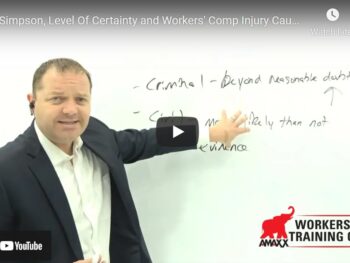
When this happens and the employer continues to pay the employee’s salary yet “donates” the employee’s time to the charity (rather than having the insurance company pay workers comp indemnity lost wages), are the wages a charitable donation?
IRS Section 162
United States tax law Section 162 of the Internal Revenue Code is found at 26 U.S.C. § 162. It concerns deductions for business expenses. According to the IRS, to be deductible, a business expense must be both ordinary and necessary. An ordinary expense is one that is common and accepted in the business. A necessary expense is one that is helpful and appropriate for the business. An expense does not have to be indispensable to be considered necessary.
The United States Supreme Court in the case of Welch v. Helvering found that the words “ordinary” and “necessary” have different meanings, both of which must be satisfied. The Supreme Court said that an “ordinary” expenseis customary or usual and of common or frequent occurrence in the taxpayer’s trade or business. A “necessary” expense is one that is appropriate and helpful for development of the business.
Section 162(a)(1) allow as a deduction all the ordinary and necessary expenses paid or incurred during the taxable year in carrying on any trade or business, including “ a reasonable allowance for salaries or other compensation for personal services actually rendered.”
Section 162(b) excepts charitable contributions and gifts from business deductions. It states that: “No deduction shall be allowed under subsection (a) for any contribution or gift which would be allowable as a deduction under section 170 were it not for the percentage limitations, the dollar limitations, or the requirements as to the time of payment, set forth in such section.” (See classification issues, below).
Employee’s Donated Time to Charity
According to Ron Larrow, CPA, MST, the wages an employer pays an injured worker donating their time to charity are a deductible business expense under Section 162. They are ordinary and necessary expenses as paid or incurred in the trade or business of the taxpayer without limitation. There are limitations to deducting charitable expenses. These expenses need not be reclassified as “charitable” deductions.
The employer’s ability to deduct these expenses incurred for wages is NOT further restricted by assigning the injured workers to help in the community instead of allowing the worker to not report to any particular place (such as an idle room or taking work home) because suitable assignments are not currently available.
In other words, these expenses need not be qualified as a charitable deduction to get the business tax deduction.
Issues of Classification
One problem with classification as a charitable deduction versus an ordinary business expense is that charitable donations are limited to 10% of taxable income of a C corporation.
An individual taxpayer who includes on their individual income tax return their share of an S corporation, LLC or partnership business income and is allowed a deduction for specifically allocated deductions such as charitable deductions are limited to 50% of adjusted gross income (AGI) for charitable deduction in addition to the limitation on use of itemized deductions, which are only deducted after computing AGI on the first page of the individual tax return. Some states, like Connecticut, do not allow those deductions for individuals.

Contact: mstack@reduceyourworkerscomp.com.
Workers’ Comp Roundup Blog: http://blog.reduceyourworkerscomp.com/
©2022 Amaxx LLC. All rights reserved under International Copyright Law.
Do not use this information without independent verification. All state laws vary. You should consult with your insurance broker, attorney, or qualified professional.











